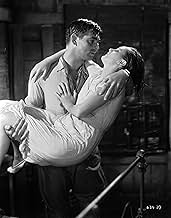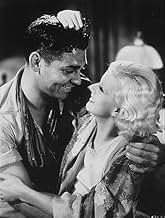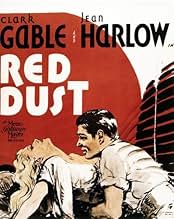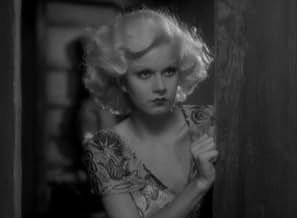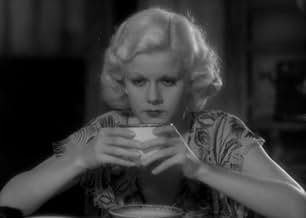CALIFICACIÓN DE IMDb
7.2/10
5.2 k
TU CALIFICACIÓN
El dueño de una plantación de caucho se involucra con la nueva esposa de uno de sus empleados.El dueño de una plantación de caucho se involucra con la nueva esposa de uno de sus empleados.El dueño de una plantación de caucho se involucra con la nueva esposa de uno de sus empleados.
- Dirección
- Guionistas
- Elenco
- Premios
- 4 premios ganados en total
- Dirección
- Guionistas
- Todo el elenco y el equipo
- Producción, taquilla y más en IMDbPro
Opiniones destacadas
Context is an important element in viewing any work of art or commerce and movies are both. "Red Dust" at it's core is about human weakness and strength, in degree and in full force. Mary Astor, a star since appearing opposite John Barrymore in "Don Juan", plays a repressed wife who doesn't believe in the strength of her husband (Gene Raymond) nor her own weakness when it comes to resisting the animal magnetism of rubber plantation owner Dennis (Clark Gable). Conversely, Gable doesn't realize his weakness in letting himself get involved with the ladylike Astor and underestimates the strength of prostitute Vantine (Jean Harlow) who, when Astor shoots Gable, gives witness to Raymond that his wife is innocent and that Gable deserved shooting. For it's time, 1932, "Red Dust" is sexually progressive, showing the freely running passions of Gable and the two women, while in retrospect, it's depiction of Asians is as poor stereotypes. Willie Fung, who plays Gable's houseboy, is also derided as gay in the script by the line delivered by Jean Harlow. Harlow notices Fung giggling at her underwear, to which she replies "Gee...you even find them in the jungle."
"Red Dust" has a tremendous "back story" as well. John Gilbert was to play the part of Dennis originally as an attempt to bolster his masculine image which had been damaged by the higher-than-anticipated timbre of his voice as recorded by early sound equipment. With the sensation caused by Gable when he returned Norma Shearer's slap in the face in "A Free Soul" Gable's star rose mercurily. No "hero" ever countered the indignation of the leading lady before, and certainly not the divas at Metro-Goldwyn-Mayer. Gable was a whole new breed of leading man. Jean Harlow's star had been on the ascendant after scoring a huge hit in "Red Headed Woman" a scandalous story of a secretary who sleeps her way to the top. The realism of these two performers in those films made them a natural for the raw jungle tale of passion and betrayal. In the middle of the making of the film, Jean Harlow's producer-husband, Paul Bern, was found dead. The scandal that followed frightened the studio who thought that Harlow's career was over. Scandal had ruined the careers of Fatty Arbuckle and Clara Bow, causing their studio (Paramount) to loose millions on their films. M.G.M. was surprised when Harlow's fame and popularity increased. For her part, Harlow returned to the studio and never spoke an unkind word about her late husband. Bern, it turned out, had a common law wife who had emerged from years-long institutionalization and confronted him about his new wife.
Racism is not a key element in the plot of "Red Dust". For that, you would have to see "The Mask of Fu Manchu" where the Asians are neither lazy nor stupid, but sexual predators, instead. Or you could watch any number of other World War Two American movies with Asians in them. But for accurate Pre-censorship Hollywood adult dialogue and plot, "Red Dust" will do nicely, thank you.
"Red Dust" has a tremendous "back story" as well. John Gilbert was to play the part of Dennis originally as an attempt to bolster his masculine image which had been damaged by the higher-than-anticipated timbre of his voice as recorded by early sound equipment. With the sensation caused by Gable when he returned Norma Shearer's slap in the face in "A Free Soul" Gable's star rose mercurily. No "hero" ever countered the indignation of the leading lady before, and certainly not the divas at Metro-Goldwyn-Mayer. Gable was a whole new breed of leading man. Jean Harlow's star had been on the ascendant after scoring a huge hit in "Red Headed Woman" a scandalous story of a secretary who sleeps her way to the top. The realism of these two performers in those films made them a natural for the raw jungle tale of passion and betrayal. In the middle of the making of the film, Jean Harlow's producer-husband, Paul Bern, was found dead. The scandal that followed frightened the studio who thought that Harlow's career was over. Scandal had ruined the careers of Fatty Arbuckle and Clara Bow, causing their studio (Paramount) to loose millions on their films. M.G.M. was surprised when Harlow's fame and popularity increased. For her part, Harlow returned to the studio and never spoke an unkind word about her late husband. Bern, it turned out, had a common law wife who had emerged from years-long institutionalization and confronted him about his new wife.
Racism is not a key element in the plot of "Red Dust". For that, you would have to see "The Mask of Fu Manchu" where the Asians are neither lazy nor stupid, but sexual predators, instead. Or you could watch any number of other World War Two American movies with Asians in them. But for accurate Pre-censorship Hollywood adult dialogue and plot, "Red Dust" will do nicely, thank you.
A very entertaining movie with Gable and Harlow at their best.They really shine in their roles.Also a good performance by a young Mary Astor.It's easy to see that Clark Gable consolidated his newly won fame with this film.He shows his magnificent charisma on the screen perhaps for the first time to full effect.Harlow matches him all the way.An inspired pairing.
This actually is as good as the publicity says. Definitely one to watch.
Back in the thirties, MGM might be thought of as slightly smug and arrogant but watching this you can understand why they were a bit self satisfied. They were the studio who really knew how to make a movie.
Care, detail and time were clearly invested to evoke the feel the insect laden, steamy Indonesian rain forest where the normal constraints and rules of society don't apply. In a similar sort of way to how Coppola evoked the surreal, dislocated world of Colonel Kurtz in Apocalypse Now, Victor Fleming brings Clarke Gable's private fiefdom vibrantly to life.
What makes this film so watchable ninety years after it wowed the audiences back in 1932 are the two stars. Gable is perfect as the world's most macho man; you can almost smell the gallons of testosterone he sweats out. I've never been a fan of Jean Harlow but for once, she really shows what she can do - she is brilliant in this. You've also got to impressed by her professionalism in the way she effortlessly makes the personality of her character so real considering her husband was either murdered or committed suicide during its filming.
Back in the thirties, MGM might be thought of as slightly smug and arrogant but watching this you can understand why they were a bit self satisfied. They were the studio who really knew how to make a movie.
Care, detail and time were clearly invested to evoke the feel the insect laden, steamy Indonesian rain forest where the normal constraints and rules of society don't apply. In a similar sort of way to how Coppola evoked the surreal, dislocated world of Colonel Kurtz in Apocalypse Now, Victor Fleming brings Clarke Gable's private fiefdom vibrantly to life.
What makes this film so watchable ninety years after it wowed the audiences back in 1932 are the two stars. Gable is perfect as the world's most macho man; you can almost smell the gallons of testosterone he sweats out. I've never been a fan of Jean Harlow but for once, she really shows what she can do - she is brilliant in this. You've also got to impressed by her professionalism in the way she effortlessly makes the personality of her character so real considering her husband was either murdered or committed suicide during its filming.
This film was the one which really showcased Jean Harlow, fresh at MGM after a stint at Columbia, and a film or two as one of the muses of Howard Hughes.
In real life she'd married and been widowed in quick succession, and although the Paul Bern scandal must have been a strain, it doesn't show here on screen. Harlow is absolutely luminous, a wise-cracking hardboiled good-time girl with a soft centre and a hint of innocence. What else could she be but a bright platinum blonde? Mary Astor, tight-laced and classy, arrives at the sexually-charged rubber plantation with feverish husband Gene Raymond, and catches the eye of wide-boy hard-man Clark Gable (a real he-man of the 'grab em by the hair' school).
A fascinating slice of 1930s pre-Production Code history, 'Red Dust' sizzles and is always in heat. Remade as 'Mogambo' and apart from the addition of colour, some recasting (Gardner for Harlow, Grace Kelly for Astor, Donald Sinden for Raymond), it remained a heady brew, even down to the indefatigable Mr Gable reprising his role as Carson!
In real life she'd married and been widowed in quick succession, and although the Paul Bern scandal must have been a strain, it doesn't show here on screen. Harlow is absolutely luminous, a wise-cracking hardboiled good-time girl with a soft centre and a hint of innocence. What else could she be but a bright platinum blonde? Mary Astor, tight-laced and classy, arrives at the sexually-charged rubber plantation with feverish husband Gene Raymond, and catches the eye of wide-boy hard-man Clark Gable (a real he-man of the 'grab em by the hair' school).
A fascinating slice of 1930s pre-Production Code history, 'Red Dust' sizzles and is always in heat. Remade as 'Mogambo' and apart from the addition of colour, some recasting (Gardner for Harlow, Grace Kelly for Astor, Donald Sinden for Raymond), it remained a heady brew, even down to the indefatigable Mr Gable reprising his role as Carson!
For those that have never seen a pre-Code film, RED DUST is a great film to begin with. It certainly isn't shy about dealing with adultery, prostitution, or heavy drinking. Although it was made over 70 years ago, it holds up extremely well by today's standards. This is due to a well written script that dealt with these subjects directly and wasn't restrained by the Production Code that was enacted 2 years later. Later films either didn't deal with this type of content or did so in a way that was ridiculous. It is also due to the performances of a rugged and virile Clark Gable and a strong willed and street smart Jean Harlow and a strong supporting cast. There is no doubt as to the sexual stamina of their two characters. We find this out early and often. One example is when Gable tucks money down Harlow's dress and says, "It's been nice having you." and spanks her behind. Most modern films would have shown a sex scene while films subject to the code would have treated its audience as children and made us aware in a ridiculous way that would satisfy the censors. The scene where he warns her against misusing the plumbing and attempts to pull her out of the water barrel(yes, she's naked, but we don't see the nudity) while the society woman he is trying to seduce watches on is hilarious. Clark Gable and Jean Harlow made one the better on screen couples of that time. It is a shame that her career was tragically cut short. I also enjoyed the scene where a frightened Mary Astor slaps him across the face for his indifference to the plight of her sick husband and he responds with a smug and confident grin. The movie also gives one an appreciation of the primitive conditions people lived in on a rubber plantation during that time. RED DUST is directed by Victor Fleming who would later direct THE WIZARD OF OZ and Clark Gable in GONE WITH THE WIND. People have complained that this film is racist, but need to realize that the world was a much different place in 1932 than in 2003. If you can do that, you'll probably enjoy this film. 9/10
¿Sabías que…?
- TriviaDuring filming of the famous rain-barrel sequence, Jean Harlow reportedly stood up--topless--and called out something along the lines of "one for the boys in the lab!" Director Victor Fleming allegedly removed the film from the camera to prevent any footage from reaching the black market.
- ErroresWhen Clark Gable and Gene Raymond are in the tree while hunting, after the line: 'This would be a bad country to raise children in, wouldn't it?' Thecloud in the background changes dramatically.
- Citas
Barbara Willis: [watching the workers pouring liquid rubber] Why, it's milk.
Dennis Carson: Oh no, just rubber. But you could drink it if you care to stretch a point.
Barbara Willis: Oh, I once knew a man who made a joke like that. He was run over by a truck.
Dennis Carson: Were you driving it?
Barbara Willis: Yes!
Dennis Carson: Well, you're out of luck here. We only have ox-carts and every ox knows me personally.
- ConexionesEdited into Hollywood: The Dream Factory (1972)
Selecciones populares
Inicia sesión para calificar y agrega a la lista de videos para obtener recomendaciones personalizadas
- How long is Red Dust?Con tecnología de Alexa
Detalles
Taquilla
- Presupuesto
- USD 408,000 (estimado)
- Tiempo de ejecución
- 1h 23min(83 min)
- Color
- Relación de aspecto
- 1.37 : 1
Contribuir a esta página
Sugiere una edición o agrega el contenido que falta

